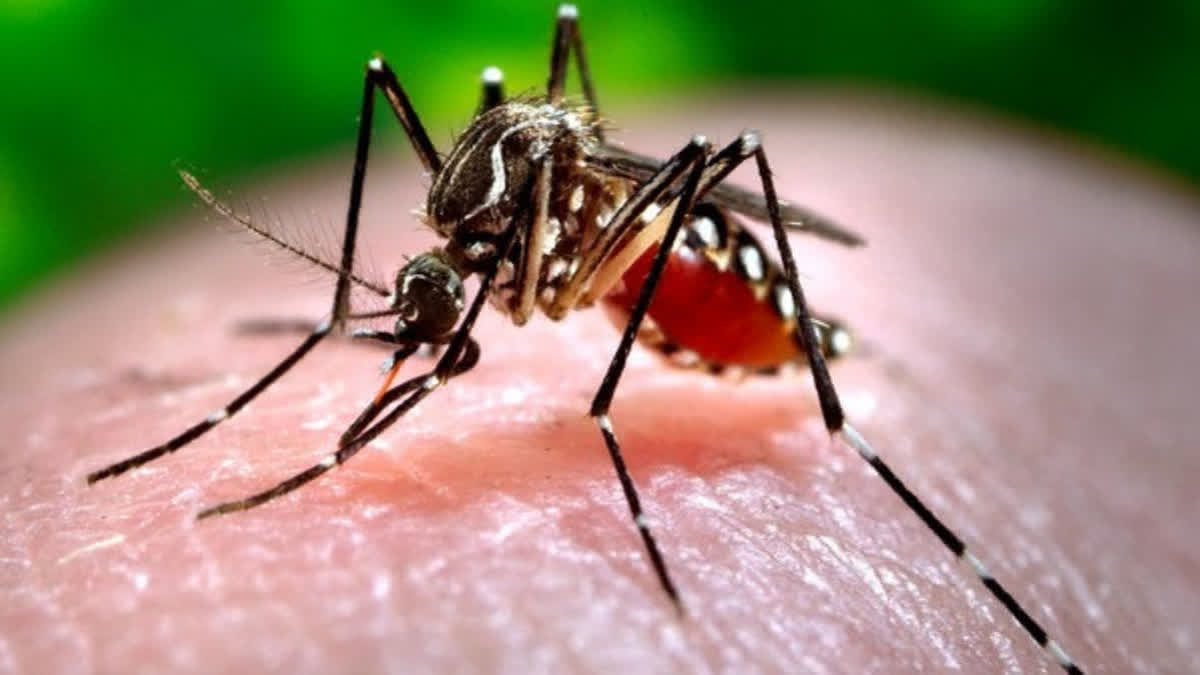Hyderabad: Dengue (break-bone fever) is a viral infection transmitted to humans through the bites of infected mosquitoes, primarily the Aedes Aegypti mosquito. The vector-borne disease has become a significant concern, especially in tropical and subtropical climates around the world. Current estimates indicate a staggering 100–400 million infections each year, with about half of the global population now at risk.
Transmission- The Aedes Aegypti mosquito is the primary vector for dengue, transmitting the dengue virus (DENV) to humans. After feeding on a DENV-infected person, the virus replicates in the mosquito mid gut before disseminating to secondary tissues, including the salivary glands.
Incubation period- The time mosquito takes from ingesting the virus to actual transmission to a new host is termed the extrinsic incubation period (EIP). The incubation takes about 8–12 days when the ambient temperature is between 25–28°C.
Variations in the incubation period are not only influenced by ambient temperature; several factors such as the frequent fluctuations in daily temperature, virus genotype, and viral load can have a bearing on the time it takes for a mosquito to transmit the virus. Once infectious, the mosquito can transmit the virus for the rest of its life.
Human-to-mosquito transmission- Mosquitoes can become infected by people who are viremic with DENV. This can be someone who has a symptomatic dengue infection, someone who is yet to have a symptomatic infection (they are pre-symptomatic), but also people who show no signs of illness as well (they are asymptomatic).
Human-to-mosquito transmission can occur up to 2 days before someone shows symptoms of the illness, and up to 2 days after the fever has resolved.
Maternal transmission- The primary mode of transmission of DENV between humans involves mosquito vectors. There is evidence however, of the possibility of maternal transmission (from a pregnant mother to her baby). At the same time, vertical transmission rates appear low, with the risk of vertical transmission seemingly linked to the timing of the dengue infection during the pregnancy. When a mother does have a DENV infection when she is pregnant, babies may suffer from pre-term birth, low birthweight, and fetal distress.
There can be other transmission methods too like through blood products, organ donation and transfusions have been recorded.
Symptoms- Usually the symptoms of Dengue can be mild or severe. Mild symptoms include high fever, severe headache, muscle and joint pains, nausea, swollen glands, vomiting and rashes in the body.
The severe symptoms include abdominal pain, rapid breathing, bleeding gums or nose, fatigue, restlessness, weakness in the body, pale and cold skin and blood in vomit or stool.
Global concerns- Dengue's prevalence has grown dramatically in recent decades, with cases reported to WHO increased from 5,05,430 cases in 2000 to 52 lakhs in 2019. The disease is now endemic in over 100 countries, with Asia bearing about 70% of the global disease burden. And, dengue is spreading to new regions, including Europe, and explosive outbreaks have been recorded.
One modelling estimate indicates 390 million dengue virus infections per year of which 96 million manifest clinically. Another study on the prevalence of dengue estimates that 3.9 billion people are at risk of infection with dengue viruses.
According to the WHO, largest number of dengue cases ever reported globally was in 2019. All regions were affected, and dengue transmission was recorded in Afghanistan for the first time. The American Region reported 3.1 million cases, with more than 25,000 classified as severe. A high number of cases were reported in Bangladesh (1,01,000), Malaysia (1,31,000) Philippines (4,20,000), Vietnam (3,20,000) in Asia.
Prevention and treatment- Preventing mosquito bites is crucial in minimising the risk of dengue. Currently, there is no specific treatment for dengue, and management focuses on alleviating symptoms, often utilizing acetaminophen (paracetamol) to control pain. Non-steroidal anti-inflammatory drugs like ibuprofen and aspirin are avoided due to their potential to increase the risk of bleeding.
Home remedies can include taking adequate rest, drinking plenty of liquids, using acetaminophen (paracetamol) for pain, eating fruits and drinking warm water.
Vaccine development- Dengvaxia is the only approved vaccine for dengue, offering protection for those with past dengue infection. Several additional dengue vaccine candidates are in evaluation stages, holding promise for future prevention efforts.
Dengue in India- In the recent months, the country has witnessed a rapid surge in the number of dengue cases especially in states like Jharkhand, Odisha, Maharashtra, Karnataka, Bihar and New Delhi. Bihar recorded over 300 cases in a single day of September, with a cumulative of over 3,000 cases in September whereas, Delhi recorded a staggering 5,221 cases of dengue till September 17 this year.
According to the National Center for Vector Borne Diseases Control, a total of 94,198 cases have been recorded in 2023 (as on Sept. 17, 2023). Of which 91 infections were fatal.



